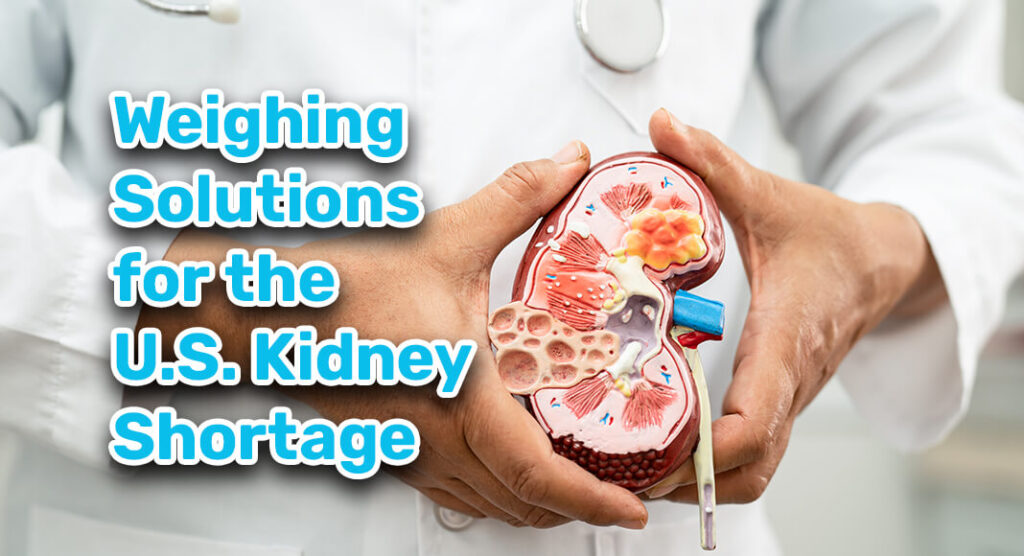
Mega Doctor News
The U.S. kidney shortage has reached a critical point, with nearly 90,000 people waiting for transplants and only around 27,000 performed this year, according to a report by Caroline Catherman in Healthcare Brew (September 2024). The United Network for Organ Sharing (UNOS) warns that one in 20 people on the waitlist dies each year. Experts grapple with this crisis, seeking solutions from financial incentives to medical innovation.
One of the boldest ideas being considered is the End Kidney Deaths Act, a bipartisan bill proposing financial incentives for living kidney donors. If passed, it would offer $10,000 in refundable tax credits per year for five years to those anonymously donating a kidney. While this would help increase non-directed donations, LaVarne Burton, president of the American Kidney Fund (AKF), expressed reservations. In Catherman’s report, Burton notes concerns about how this could encourage vulnerable populations to donate without considering their long-term health. This raises an important ethical debate—can financial incentives save lives without exploiting disadvantaged groups?
Alternatively, the Living Organ Volunteer Engagement (LOVE) Act, though still in development, would tackle donation’s logistical and financial hurdles. It would reimburse donors for out-of-pocket expenses and provide up to $2,500 per week in lost wages for up to eight weeks. As Martha Gershun, a living donor and advocate, points out in Healthcare Brew, the donation process is not only physically taxing but can be financially burdensome, making policies like the LOVE Act crucial for expanding the donor pool.
Beyond increasing donor numbers, reforming how organs are managed is essential to tackling the crisis. A 2018 analysis cited by Catherman shows that 20% of available kidneys are discarded, often due to inefficiencies like failing to match recipients in time. The Increasing Organ Transplant Access (IOTA) model—a proposal from the Centers for Medicare and Medicaid Services (CMS) and the Health Resources and Services Administration—aims to address this by tying hospital payments to the performance of their transplant programs.
However, this push for greater efficiency has been met with resistance. The American Hospital Association (AHA) worries that an emphasis on increasing transplant volumes could compromise the quality of matches, leading to suboptimal outcomes. As highlighted in Catherman’s report, balancing volume with quality remains a crucial challenge for policymakers.
While legislative solutions and system reforms aim to maximize existing resources, startups are pursuing more radical innovations. Massachusetts-based eGenesis is pioneering xenotransplantation, precisely genetically engineering pig kidneys for human use. Though the success of their first transplant attempt was limited, their efforts represent a potential game-changer, offering an alternative to relying solely on human donors.
At the same time, technology is being harnessed to prevent kidney failure in the first place. Healthcare Brew reports on Healthy.io, a startup that developed Minuteful Kidney app, which enables patients to perform at-home kidney function tests. Early detection of kidney disease could help reduce the number of people needing transplants by providing earlier access to treatment, a point emphasized by nephrologist Alexander Chang in Catherman’s report.
As Catherman’s Healthcare Brew article demonstrates, addressing the U.S. kidney shortage requires a multifaceted approach. Financial incentives like those proposed in the End Kidney Deaths Act may boost donation numbers, but they must be carefully crafted to avoid ethical pitfalls. At the same time, systemic reforms, such as the IOTA model, aim to ensure every available kidney is effectively used. Meanwhile, biotech innovations and early detection technologies offer hope for reducing the demand for transplants altogether.
The U.S. kidney crisis stresses the need for collaboration across sectors—policymakers, healthcare providers, and biotech companies must work together to create a future where kidney failure is no longer a death sentence. As Catherman’s comprehensive report highlights, these solutions, while complex, are within reach if pursued with equity and efficiency in mind.














